Canada, often described as the land of opportunity, continues to beckon individuals from all corners of the world to pursue prosperous careers and better lives. The Canadian job market shines brightly, offering an array of high-demand occupations waiting to be explored.
This guide will take you to Canada's top 10 sought-after careers, exploring the educational prerequisites, licensing essentials, and application procedures for each profession.
Get ready to apply to jobs in Canada with this spectacular guide.
Jobs in Canada
1. Registered Nurse (RN)
As a registered nurse, you can work in Canada hospitals, clinics, nursing homes, community health centers, schools, and home healthcare, providing care to patients of all ages in Canada.
Education
- Charting your course as a Registered Nurse (RN) in Canada can begin with a Bachelor of Science in Nursing (BSN) program or a Diploma in Nursing from a recognized/approved institute in your country.
- You must have valid nursing registration within the nursing council of your home country.
- You can process your immigration to Canada with 2-5 years of experience in the nursing profession.
- You must have proof of English or French language competency.
Licensing
- After completing your education, the pivotal step is to successfully pass the NCLEX-RN (National Council Licensing Examination) exam.
- The CPNRE (Canadian Practical Nurse Registration Exam) is required to apply for Registered Practical Nurse.
- You must fulfill the licensing prerequisites mandated by the province where you intend to practice.
How to Apply
Opportunities for RNs abound in healthcare facilities, hospitals, and nursing homes. Provincial nursing associations can guide to valuable repositories of job listings in Canada.
2. Software Developer
When looking for jobs in Canada, software developers can find employment opportunities in technology companies, financial institutions, healthcare organizations, government agencies, and software development firms in Canada.
Education
The cornerstone of a career as a software developer lies in acquiring a Bachelor's or Master's degree in computer science or a closely related field such as engineering.
Skills
- Proficiency in programming languages such as Java, Python, SQL, PHP, C, or C++ is the bedrock upon which success in this profession is built.
- It'd be much better if the developer is an expert in one or more of the latest programming languages.
How to Apply
The realm of software development is filled with opportunities. Job openings can be uncovered through dedicated tech job boards, perusing company websites, or participating in online networking events within the tech industry. Connect with former and current employees when looking for jobs in Canada in software development. Ensure you have a valid Canada work visa to help you get in hassle-free.
3. Electrician
Electricians can work in residential, commercial, and industrial sectors in Canada. They find employment in construction companies, electrical contractors, maintenance teams, and manufacturing facilities. Having a valid Canada work visa is mandatory for electricians.
Education
Embarking on the journey to becoming an Electrician often commences with completing 4 to 5 years of an apprenticeship program.
Certification
- Trade certification for construction electricians is compulsory in Newfoundland and Labrador, Nova Scotia, Prince Edward Island, New Brunswick, Quebec, Ontario, Manitoba, Saskatchewan, and Alberta.
- Trade certification for construction electricians is voluntary in British Columbia, the Yukon, the Northwest Territories, and Nunavut.
- Trade certification for electricians (domestic and rural) is compulsory in Newfoundland and Labrador, and Ontario.
- You might need to get certified by a regulatory authority in the province you want to work in Canada.
How to Apply
Aspiring electricians frequently embark on their career path by pursuing apprenticeships offered through trade unions or by contacting electrical contractors in their local area.
4. Pharmacist
Pharmacists can work in community pharmacies, hospitals, clinics, long-term care facilities, and research institutions in Canada.
Education
- The educational foundation for pharmacists in Canada is the Doctor of Pharmacy (PharmD) degree.
- Fluency in English or French.
- Complete a national board examination through the Pharmacy Examining Board of Canada.
Licensing
Beyond completing your education, securing a Pharmacist Evaluating Exam (PEBC) pass and partaking in an internship to gain practical experience are prerequisites. As a job seeker in Canada, you must have a valid Canada work visa to apply for any licenses and courses.
How to Apply
Pharmacists can explore employment opportunities in diverse healthcare settings, including pharmacies and hospitals. Job seekers in Canada are encouraged to peruse online job boards and increase networking efforts to uncover promising prospects.
5. Data Analyst
Data analysts can find work opportunities in Canada in healthcare, finance, technology, government, retail, and marketing.
Education
A master's or higher degree in data science, statistics, or a closely related field provides the essential grounding for a career as a Data Analyst.
Skills
Mastery of data analysis tools such as Python, R, data visualization, statistics, machine learning, or SQL is pivotal for excelling in this field.
How to Apply
The domain of data analysis brims with possibilities. Job listings and career avenues for data analysts can be scouted through specialized data science job boards and company websites.
6. Mechanical Engineer
Mechanical Engineers can find employment opportunities in manufacturing, construction, aerospace, automotive, energy, and consulting firms, contributing to diverse industries with their expertise in Canada. You must have a valid Canada work visa in case you are immigrating for jobs in Canada.
Education
Mechanical Engineers traditionally commence their journey with a Bachelor's degree in mechanical engineering.
Licensing
- Paving the way for a career as a mechanical engineer necessitates registration with the provincial or territorial association of professional engineers to approve engineering drawings and reports and to practice as a Professional Engineer (P.Eng.).
- You might need to get certified by a regulatory authority before working in your chosen province.
How to Apply
Opportunities in mechanical engineering can be unearthed through job boards and by exploring vacancies with engineering firms.
7. Carpenter
Carpenters can work in residential and commercial construction, renovation companies, and carpentry unions. They can also work for themselves as independent contractors on construction and renovation projects in Canada. If you are seeking jobs in Canada as an immigrant, ensure you have a valid Canada work visa.
Education
Aspirants venturing into carpentry often embark on their career voyage by enrolling in the Ontario Secondary School Diploma (OSSD) or equivalent and then in a carpentry apprenticeship program of 3 to 4 years.
Certification
Attaining the status of a Journeyman Carpenter or acquiring a Red Seal endorsement involves satisfying the certification criteria.
How to Apply
Prospective carpenters regularly access carpentry opportunities via carpentry unions and construction companies.
8. Occupational Therapist
Occupational therapists can find employment in hospitals, clinics, rehabilitation centers, schools, private practices, and community organizations in Canada.
Education
Occupational Therapists chart their course by pursuing an MSc (OT) entry-to-practice degree program and passing the National Occupational Therapy Certification Examination (NOTCE) offered by the Canadian Association of Occupational Therapists exam.
Licensing
Registration with the provincial regulatory body is an imperative prerequisite for practicing Occupational Therapists. You must have a valid Canada work visa to apply for jobs in Canada and seek licensing.
How to Apply
Occupational therapists are presented with opportunities across various healthcare settings, including hospitals, clinics, and rehabilitation centers.
9. Financial Advisor
Financial advisors can work in banks, credit unions, investment firms, and insurance companies. They can also work as independent advisors serving individual clients or businesses in Canada.
Education
The educational groundwork for Financial Advisors typically encompasses a Bachelor's degree in business administration, commerce, economics, or a related discipline.
Certification
Achieving excellence in this profession often necessitates completing the Certified Financial Planner (CFP) program.
How to Apply
Financial institutions and independent advisory firms open avenues for financial advisors to embark on their careers.
10. Truck Driver
Truck drivers can find employment with trucking companies and logistics firms in Canada. They can also explore owner-operator opportunities to transport goods and commodities nationwide.
Education
Aspiring truck drivers kick start their careers by completing secondary school, on-the-job training, and an accredited driver training course of up to three months through a vocational school or community college. You must have a valid Canada work visa if you are from outside Canada.
License
- You need a Class 3 or D to drive straight-body trucks.
- You need a Class 1 or A license to drive long combination vehicles.
- You need an air brake endorsement (Z) to operate vehicles equipped with air brakes.
- You might need to get certified by a regulatory authority before working in your province or territory.
How to Apply
Abundant opportunities for truck drivers can be explored through trucking companies, logistics firms, and owner-operator prospects.
Conventionally unconventional jobs in Canada await you!

Canada is an excellent place for work, and you can do many different jobs. It doesn't matter if you just finished school, have lots of experience, or are new to Canada – what's important is learning what you need for your job and using the resources available. You can have a successful career in Canada with hard work, learning, and the right skills. These may seem like unconventional jobs in Canada but the ultimate point is - Canada welcomes skilled workers who can contribute to the growth of the overall economy.





Leave a reply